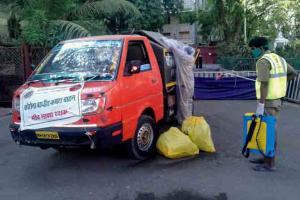They make kin understand the importance of their jobs, don PPE kits and set out for a perilous task in the fight against Coronavirus as conservancy workers

Conservancy workers collect biomedical waste in the G North ward
Encouraging everyone around him to stay indoors, Mayur Jadhav himself has been visiting various containment zones in Lokhandwala and Oshiwara wearing a PPE suit for three to four hours daily. A frontline worker, Jadhav does the risky job of collecting bio-medical waste from residential buildings and COVID-19 quarantines.
Amid the Coronavirus-caused lockdown, people are asked to put household waste in black bags and bio-medical waste — gloves, masks and items touched by COVID-19 patients, staffers at a quarantine facility — in yellow bags.
Like Jadhav, conservancy workers dealing with bio-medical waste are trained for the task. Jadhav, 30, resides at Durgadevi Chawl, Vakola and after weeks of practice, he is comfortable with the job. "Initially, I was worried as I had heard many were getting sick. But once we get the hang of it, we do the work without problems. Every day, we put sanitiser and spray disinfectant on the yellow bag and wait for five minutes before loading it on the vehicle meant only for yellow bags," he said. In K West ward, there are over 650 COVID-19 cases and over 300 containment zones.
ADVERTISEMENT
'Made wife understand'
Rishikesh Dhotre, 43, is among the workers residing far from his workplace and spends over 10 hours outdoors. He leaves his Nalasopara residence 4:45 am for Worli and returns home around 3:30 pm. "I was nervous as we were visiting places everyone was asked to avoid. My wife would fight and ask why I am the one to go. But gradually, I understood the precautions we have to take and explained them to my wife. She is worried but understands the importance of the job," Dhotre said.
While Dhotre is glad to have access to fresh PPE kits every day, he also has to contend with how hot it gets during the three-hour collection.
Worried about family
Conservancy workers constantly worry about their family members, especially senior citizens at a higher risk of infection. Sarthak Chandramani, 29, works in G North ward comprising Dharavi. He takes extra precautions once he reaches home as he has a two-and-a-half-year-old daughter and 63-year-old father.
"I don't touch my phone after wearing the PPE and I call my family before I reach home. They have strict instructions to leave the house and keep a bucket of hot water and soap near the door. They are only allowed to enter after I have soaked my clothes in the bucket and gone for a bath," he said.
Chandramani often picks up medical waste falling out of the garbage bags with his hands. "People often overstuff garbage bags and then they can't be tied. Waste falls out from overflowing bags and we have to disinfect it, put back in the bag and disinfect the bag again," he said. Chandramani lives in BDD chawl, another high-risk area.
After the recent death of a civic official on food-distribution duty in Dharavi due to COVID-19, the BMC is screening all staffers. Kiran Dighavkar, assistant municipal commissioner, G North ward, said, "We have around 900 labourers collecting waste and there are 200 containment zones in this ward. We conduct screening once a week and check for fever with infrared thermometers. We have also counselled staffers to immediately report symptoms," he said.
Where is biomedical waste taken?
Medical waste is taken to a biomedical facility managed by the Maharashtra Pollution Control Board at Deonar. Amar Supate, principal scientific officer with MPCB said that since March 29, the facility has processed 11 tonnes of COVID-19 waste from Containment Zones and other biomedical waste.
"The yellow bags are directly put into the incinerator. Other kinds of plastic waste, glass vials, injections or syringes and scalpels are sterilised with sodium hypochlorite and then shredded for recycling," Supate said.
Catch up on all the latest Mumbai news, crime news, current affairs, and a complete guide from food to things to do and events across Mumbai. Also download the new mid-day Android and iOS apps to get latest updates.
Mid-Day is now on Telegram. Click here to join our channel (@middayinfomedialtd) and stay updated with the latest news
 Subscribe today by clicking the link and stay updated with the latest news!" Click here!
Subscribe today by clicking the link and stay updated with the latest news!" Click here!







